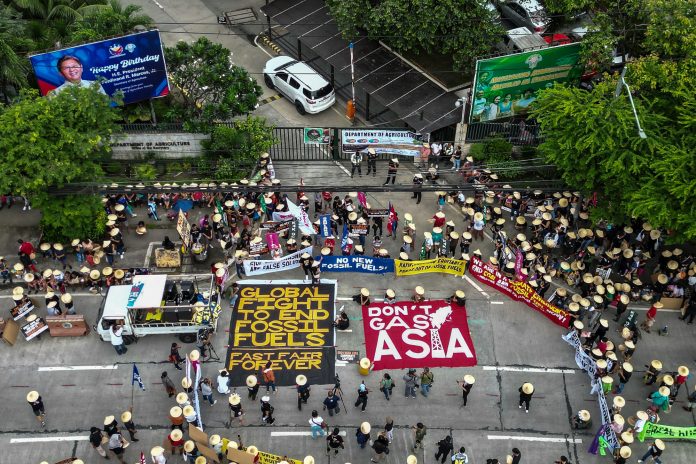Good news? Climate change is becoming more popular among Filipinos.
Bad news? Climate change is becoming more popular among Filipinos.
As 2024 draws to a close, signs are emerging that, slowly but surely, more people in the country are becoming interested in issues related to this problem. The term “heatwave” was the most-searched topic in the Philippines on Google this year, while “climate change” was the fifth most-searched news topic among online users.
A key issue related to addressing climate change—renewable energy—even made it to the list of ten issues voters perceive as most important for senators to prioritize, according to a recent Pulse Asia survey. This is a notable development, as environmental issues have rarely placed this high in previous polls.
Yet, as with any other matter, these developments present both positives and negatives for the present and future of climate action in the Philippines.
The Good News
Perhaps the most overlooked aspect of climate action in the Philippines, or elsewhere, is climate communication. So many stakeholders focus their eyes and resources on finding technological innovations and breakthroughs that other strategies are almost taken for granted.
Sometimes, the evidence is not enough to speak for itself, especially when disinformation and denialism are actively spread—from social media pages to the halls of the Philippine Congress.
In forums and consultations, policymakers and advocates often emphasize the need for dialogues to go beyond the four walls of venues. Yet, too often, they struggle to practice what they preach.
For example, I delivered a keynote speech during a university forum about the Philippines’ current Nationally Determined Contribution (NDC) using the format of a dating app to present this technical topic in a way that piqued the interest of the youth. Yet afterward, I listened as my colleagues shared their insights, filled with UNFCCC acronyms and technical jargon that an audience of mostly first-year college students was likely unfamiliar with or overwhelmed by.
Climate words still matter as much as actions. After all, many people still lack a basic understanding of the climate crisis—especially in terms of connecting it to their daily lives and future.
There is still much about the climate crisis that requires further research, from maturing renewable technologies to attribution science, which in turn demands proper communication to stakeholders.
The importance of climate communication is also becoming increasingly acknowledged among experts and policymakers. In the latest edition of the Philippine Climate Change Assessment Report, scientists recognize the need to build capacities for effectively communicating technical information to different communities and to establish stronger links with science communicators in the country.
The art of climate communication seems simple because, as many folks say these days, it’s just talk. But it is difficult to practice properly—a lesson that many policymakers, scientists, and even activists are struggling with. At the end of the day, those with knowledge must ensure that their message gets across and inspires people to take action.
With clear growing interest in climate change among Filipinos, the next 12 months present an opportune time for the government, academe, and civil society to collaborate and put a much-needed spotlight on climate communication. This must include stronger integration of climate change into school curricula, educational campaigns through platforms such as TikTok, and exploring other media forms for engagement, such as video games.
Also critical is the development of a National Action for Climate Empowerment (ACE) Strategy, which would enable programs on education, training, and awareness-raising. This strategy would empower more Filipinos with access to key information, encourage participation in decision-making, and foster collaboration to effectively respond to the impacts of the climate crisis.
The Bad News
On the other hand, it is evident that climate change is becoming more popular in the Philippines as a reaction to extreme weather events experienced in 2024. Within a few months, communities faced record-setting high temperatures that forced class suspensions, rising flood levels worsened by deforestation and quarrying, and the impact of six storms in just one month.
This year has seen significant progress made by the Philippine government in enhancing its climate policies and strategies. It finalized its NDC Implementation Plan and National Adaptation Plan—key steps toward reducing the country’s emissions and adapting to worsening impacts. Issues regarding accessibility and disbursement speed under the People’s Survival Fund were addressed to an extent. New laws were also passed promoting a “blue economy” and recognizing the true value and rights of nature.
Yet the reality remains: these accomplishments at the national and global levels are still unfamiliar to many local communities and even local governments. Many remain stuck in a lens of disaster response and solid waste management—undoubtedly important but insufficient as responses to the climate crisis. Some are also prone to lacking access to credible sources of information or outright believing in disinformation and denialism.
The year 2025 is poised to be critical for setting the direction of the Philippines’ blueprint for climate action in the coming decades. In this blueprint, everyone must be involved, as we are all stakeholders in solving this problem. And no one properly solves a problem they do not know or understand. It is up to those with the knowledge, passion, and responsibility to reach out and communicate.
In the era of the climate crisis, words still have to mean something.
John Leo Algo is the National Coordinator of Aksyon Klima Pilipinas and the Deputy Executive Director for Programs and Campaigns at Living Laudato Si’ Philippines. He has been representing Philippine civil society at UN climate and environmental conferences since 2016 and has worked as a climate and environment journalist since 2016.









